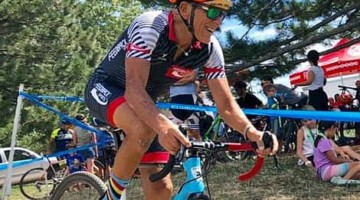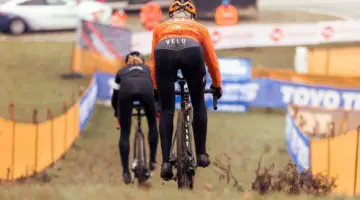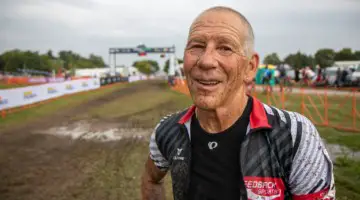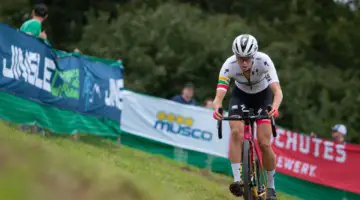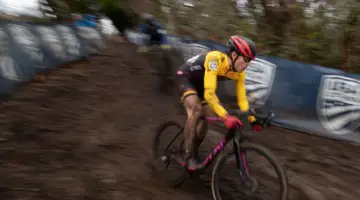With cyclocross season underway, it can be really easy to focus on the excitement of racing and forget about self-care, rest and recovery. This classic Training Tuesday from Chris Mayhew has some advice on how to take care of yourself in between races to make sure you are ready to race deep into the season.
We’ve talked a lot about racing. But now that the cyclocross season has started, or is about to start, the recovery portion is just as important as the racing portion. You can do all the training in the world but if you’re too tired to execute, it doesn’t do much good. I once watched a client fall asleep a couple of hours before his A race of the season. It was a real eye-opener as a coach and athlete.
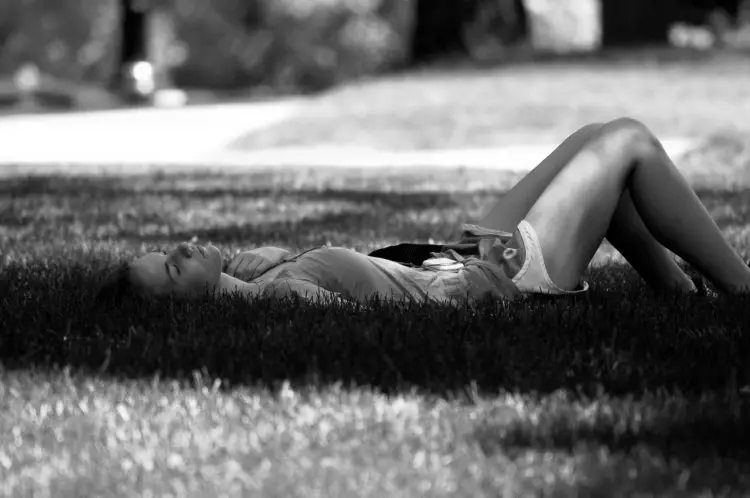
Falling asleep before your race, at the race, is probably a sign you need more rest. Training Tuesday: Focusing on Rest and Recovery. photo: always shooting
“There’s a certain comfort in being tired,” to quote Mike Creed. So many athletes think if they’re feeling beat all the time, they’re on the right path. However, especially in ’cross it’s quite the opposite, as not all of us have a lot of competing demands on our time between family, work, training and life. Let’s outline some specific behaviors to make sure you’re rested and ready come race day.
Maintenance Mondays
First and foremost, I think Monday is the cornerstone of recovery. That’s partially because I’ve been raised by cyclists, partially because I grew up in an area where no work was done on Sundays. But make sure you have one day a week that really is a focused rest day, and I think that works best as a Monday. Get your gear from your race bag washed and back in your bag. Get your bike(s) washed too.
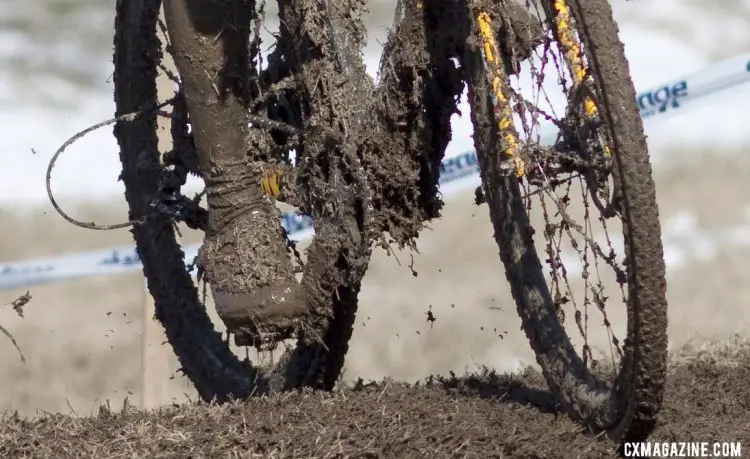
Even if you have power washed your bike after the race, if conditions were anything close to this, you will need some bike maintenance and inspection on Monday. photo: 2013 Masters Cyclocross World Championships. © Cyclocross Magazine
Yes, that’s some work, but always take care of your equipment first. It’ll be one less thing to worry about the rest of the week and it’s easier to address if you do it sooner rather than later. It also lets you plan ahead for hitting the bike shop to replace anything that you damaged over the weekend.
An underrated part of recovery at the amateur level is lowering your stress levels, especially in regards to equipment. You have to be your own Tom Hopper. Anything you can do to make your life easier and less time consuming really pays dividends as the season goes on.
The other thing I’d strongly suggest on a Monday is some sort of core or stretching work, and maybe some foam rolling. Many athletes say to themselves, “Oh, I’m not riding today, I should do something else super hard.” That’s not actually the case. Take 20 minutes and work on your IT bands, your glutes and whatever else ails you. The point is to feel better and address issues, not to have another hard thing in your life.
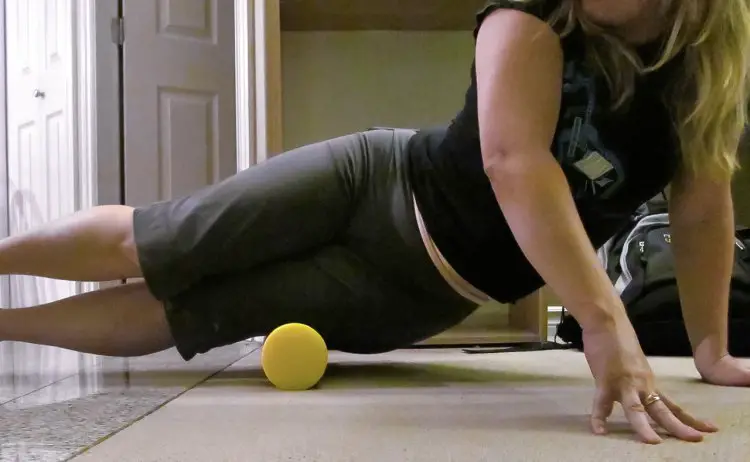
Monday is a great day to focus on your body and recovery. Foam rolling your IT bands is a good place to start. Training Tuesday: Focusing on Rest and Recovery. photo: Beth
I won’t fight you on it, but I probably wouldn’t suggest a recovery ride today. Just getting the three things above done is going to take over an hour. That may be all the time and energy you have without taking away from the rest of your life, which is fine. If you’re that tired and short on time, maybe the recovery ride gets moved to Tuesday. If you do do one, keep it very easy.
Power meters have ruined recovery rides, in my opinion. People don’t seem to know what easy is anymore. Stick it in the little ring, keep it as flat as possible, and don’t ride so hard you can’t carry on a full conversation with someone else describing every event from the weekend. And keep it short, under an hour.
You could also do 20-30 minutes on the rollers if the thought of riding indoors one more day doesn’t crush your soul, or if it’s raining and you don’t want to clean your bike again. It’s time efficient but far less fun. Do what sounds most appealing to you.
Back to the Basics: Sleep, Fuel and Hydrate
Tuesday, Wednesday and Thursday, the biggest things you can do to recover are focusing on sleeping and promptly refueling and hydrating. Before you make your coffee each morning, get down a glass of water. That’s so easy to do and yet it makes a huge difference.
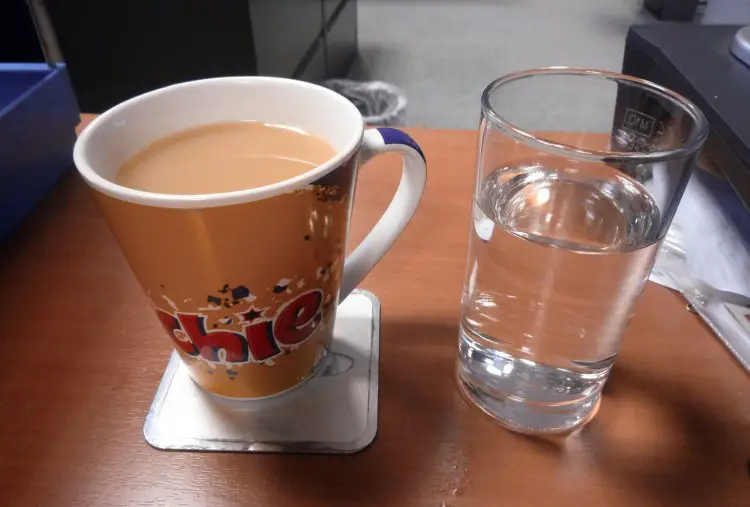
Drink the water before the coffee to ensure proper hydration, especially after a night of sleep with the heater on. Training Tuesday: Focusing on Rest and Recovery. photo: Ambernectar 13
If you’re dehydrated, you’re already behind the 8-ball, but it’s such an easy thing to correct. This will matter more too when the heat comes on in the house in October or November and you’re losing a lot of water at night to hot dry air.
You’ll probably do one or two hard workouts during the week, plus openers before the race weekend. Have a pre-set plan in place for what you’re going to eat after those workouts. I pack a Clif Builder bar for my train ride home after practice, and fill my bottles at the station. Whatever you do, have a plan in place so it’s easy to do and doesn’t require much thought. It means you get calories in you sooner and keeps your stress levels low by not having to think about what you’re going to do to enable recovery.
Once you get home, get showered, get fed, and attend to the million other things that are vying for your attention. But the other big thing you can do for recovery and to improve your on-bike performance is to get some sleep. I know, it’s hard to get to bed early. But if you don’t recover from your hard efforts, they didn’t do you much good.
“The Tour (de France) is won in bed,” claimed five-time winner Eddie Merckx. That is, it’s recovery from the hard efforts that counts, not the efforts themselves. My hobby horse here is put down your screens an hour before you want to go to bed. TV, phone, computers, all of it. Social media is such a time suck, and often a vector for feelings that make it hard to sleep. There is tons of evidence that the light from devices interfere with when you fall asleep as well. So put them away, early, and consider empowering your partner to be in charge of this.

There’s endless entertainment on your device, but prioritizing quality sleep means avoiding the blue light and emotional distraction of your phone in the hour before bed. Training Tuesday: Focusing on Rest and Recovery. photo: Stefan Schmitz
There’s also great evidence you should have another hobby outside of cycling (hat tip to Kristen Keim). So get a book and read before bed rather than stare at your phone. I’m reading about the Civil War right now.
Maybe check out Geoff Proctor’s “Behind the Stare” if you need yet another cycling fix that doesn’t involve screens. But put your screen down early and often before bed.
I’m a horrible sleeper, which means I’m a big fan of sleep aids. There are really easy things to start with, like ear plugs or an eye mask. Those make a pretty big difference in the ease of falling asleep and the quality of it. A sleep app on your smartphone can also help you track the quantity and quality of your sleep, which encourages you to look for ways to increase both.
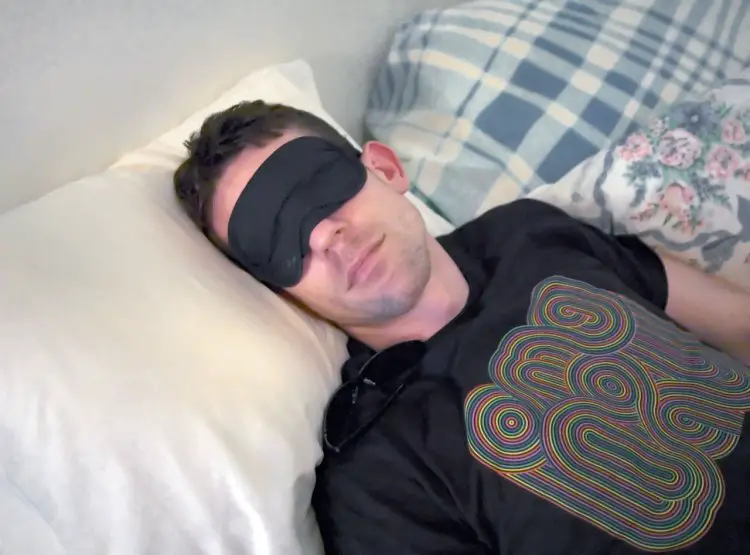
Do what you can to ensure quality sleep, including using an eye mask and/or ear plugs. Training Tuesday: Focusing on Rest and Recovery. photo: David Goehring
Another thing I have found that helps an awful lot is melatonin. It’s available over the counter. Start in small doses: 1-3mg is a good place to start. Take it 30-60 minutes before you want to be asleep and follow the recommendations from the previous paragraph. I find it’s quite helpful after a late ’cross practice or weeknight race. The major side effect is very vivid dreams, so be aware of that. But it’s a handy low-risk way to get to sleep a bit easier.
I’d recommend another day like Monday two days before you plan to race. It’ll help you hit openers harder. And the evidence is that the sleep you get this night has more impact on your performance than the sleep you get the night before the race. So why get all jacked up on a workout late at night? Take this day to make sure your gear is all packed and ready to go. Again, some stretching work to offset the hard work you’ve done during the week makes sense, perhaps wiping down and lubing the bikes. Respect the race and your competitors; show up on a clean bike.
This is a day that I think is fine for a short easy recovery ride. Early in the season it’s nice to sneak in some extra riding while it’s still nice outside. As long as you keep the ride very easy (little ring only) and short (under an hour) it shouldn’t detract from your performance. Of course, if weather or time constraints mean that you need to leave it out, feel free to do so. Don’t add to your stress by feeling guilty about missing it.
As a general rule during the week, find ways to make your life easier. Can you pay your shop to do some of your maintenance? Would sealed shifter cables make maintenance easier for you? If you’re sharing your equipment with a junior or partner would buying an extra set of wheels make a difference? Your time is worth money and at some point it might be worth more to pay someone else for his time.
The key to my client who fell asleep was buying new bottom brackets rather than repacking them (during a particularly muddy season) and getting one extra set of wheels (which he won!) so race day equipment swaps weren’t so stressful. That’s part of why taking your clothes straight from the washer to the bag makes so much sense; it means remembering what to pack is one less step you have to take during the week.
Bike racing is hard, no doubt. Why make the rest of your life hard too? As I’m fond of telling my son, work smarter, not harder. The first six to eight weeks of your season are generally termed race and recover. Once you finish your racing on the weekend look at the ways to make your life easier during the week. Learn to focus on recovery and not putting other hard things in your life.
And if the demands of life mean leaving bike riding out, take that path. The point right now is to hit the weekends fresh and rested. We can talk about what to do down the road in a later column.
’Cross Is Coming, and for some, it’s here. Have your best cyclocross season ever with all of our Training Tuesday pieces here from coaches Mayhew, Adam Myerson and Kenneth Lundgren and others. Can’t get enough? See our Cyclocross Academy and Cyclocross 101 articles here.
This article was originally published on August 30, 2016.























